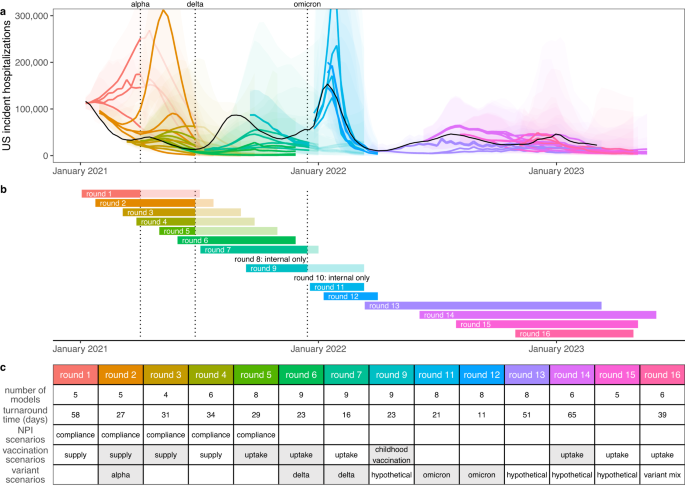2023-12-18 ペンシルベニア州立大学(PennState)
◆研究者たちは、これらのモデル予測の信頼性と精度を評価し、アンサンブルモデル(特定のシナリオに対する複数の個別モデル予測を集計したもの)が個別モデルを上回り、93%のケースで上位3つにランクインしたことを発見しました。この協力モデリングアプローチの価値が強調され、今後の病気の発生シナリオをより正確に予測する上で重要な示唆があります。
<関連情報>
- https://www.psu.edu/news/eberly-college-science/story/many-models-are-better-one-covid-19-scenario-projections-study-finds/
- https://www.nature.com/articles/s41467-023-42680-x
不確実性下でのパンデミック対応情報提供のための米国COVID-19シナリオモデリングハブの評価 Evaluation of the US COVID-19 Scenario Modeling Hub for informing pandemic response under uncertainty
Emily Howerton,Lucie Contamin,Luke C. Mullany,Michelle Qin,Nicholas G. Reich,Samantha Bents,Rebecca K. Borchering,Sung-mok Jung,Sara L. Loo,Claire P. Smith,John Levander,Jessica Kerr,J. Espino,Willem G. van Panhuis,Harry Hochheiser,Marta Galanti,Teresa Yamana,Sen Pei,Jeffrey Shaman,Kaitlin Rainwater-Lovett,Matt Kinsey,Kate Tallaksen,Shelby Wilson,Lauren Shin,Joseph C. Lemaitre,Joshua Kaminsky,Juan Dent Hulse,Elizabeth C. Lee,Clifton D. McKee,Alison Hill,Dean Karlen,Matteo Chinazzi,Jessica T. Davis,Kunpeng Mu,Xinyue Xiong,Ana Pastore y Piontti,Alessandro Vespignani,Erik T. Rosenstrom,Julie S. Ivy,Maria E. Mayorga,Julie L. Swann,Guido España,Sean Cavany,Sean Moore,Alex Perkins,Thomas Hladish,Alexander Pillai,Kok Ben Toh,Ira Longini Jr.,Shi Chen,Rajib Paul,Daniel Janies,Jean-Claude Thill,Anass Bouchnita,Kaiming Bi,Michael Lachmann,Spencer J. Fox,Lauren Ancel Meyers,Ajitesh Srivastava,Przemyslaw Porebski,Srini Venkatramanan,Aniruddha Adiga,Bryan Lewis,Brian Klahn,Joseph Outten,Benjamin Hurt,Jiangzhuo Chen,Henning Mortveit,Amanda Wilson,Madhav Marathe,Stefan Hoops,Parantapa Bhattacharya,Dustin Machi,Betsy L. Cadwell,Jessica M. Healy,Rachel B. Slayton,Michael A. Johansson,Matthew Biggerstaff,Shaun Truelove,Michael C. Runge,Katriona Shea,Cécile Viboud & Justin Lessler
Nature Communications Published:20 November 2023
DOI:https://doi.org/10.1038/s41467-023-42680-x

Abstract
Our ability to forecast epidemics far into the future is constrained by the many complexities of disease systems. Realistic longer-term projections may, however, be possible under well-defined scenarios that specify the future state of critical epidemic drivers. Since December 2020, the U.S. COVID-19 Scenario Modeling Hub (SMH) has convened multiple modeling teams to make months ahead projections of SARS-CoV-2 burden, totaling nearly 1.8 million national and state-level projections. Here, we find SMH performance varied widely as a function of both scenario validity and model calibration. We show scenarios remained close to reality for 22 weeks on average before the arrival of unanticipated SARS-CoV-2 variants invalidated key assumptions. An ensemble of participating models that preserved variation between models (using the linear opinion pool method) was consistently more reliable than any single model in periods of valid scenario assumptions, while projection interval coverage was near target levels. SMH projections were used to guide pandemic response, illustrating the value of collaborative hubs for longer-term scenario projections.

